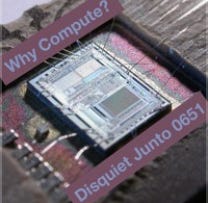Recently, I have been taking part in a weekly challenge collaboration called Disquiet Junto, moderated by
. Each Thursday, a new challenge is published based on a particular aspect, concept, and/or idea for those who take it on to create a track over the weekend. You can read more about these challenges here: https://disquiet.com/2012/01/27/the-disquiet-junto/For Disquiet Junto Project 0651: Why Compute?, we responded to a question by musician and music theorist George E. Lewis, composer-in-residence at the upcoming Musikfestival Bern: “Why do we want our computers to improvise?”
Listen here for a list of our responses:
https://on.soundcloud.com/4AfRB7NSaPiY8rxv8
Here is mine, the transcript of which appears below.
https://on.soundcloud.com/7z386nqm65okoUEG9
Question: why do we want our computers to improvise?
There are, at least, two larger questions that would be more instructive to make an answer. First, is there a sufficient number of human musicians who know how to improvise in order to work effectively with such devices? Second, why do humans improvise and what principles do they use in their guidance?
A knowledge, even at a basic level, of how to improvise is desirable. Further, even the most basic of guiding principles would be advisable.
When we think about the broad spectrum of music that has improvisation at its foundation, there are different ways already to approach improvisation.
One element that is also a principle of improvisation is listening. To listen is to change the focus from a musician’s own playing to that of all musicians collectively in that given moment. That is, to listen is to be aware constantly of what is at play among everyone playing
New music arises from the practice of listening. While there is talk of computers doing improvisation, this has long precedent in other objects that are used to be functional as musical instruments. The theremin, for example, has a long relationship to improvisation. So do samples, cassettes and reels, turntables, field recordings, musique concrète, and analog synthesizers as well as the studio itself. As well as today’s mobile processing units are known to have generated sounds in surprising ways.
Computers in improvisation can be part of this experimentation when a human is responsible and properly compensated and credited for the work. Further, it will be necessary to practice a listener’s right to know if indeed humans were involved in the creation of a work.
Yet there is an even larger question: humans will still have to listen. Larger yet, even if there is implementation of computers of any kind, let us consider the entirety of music created in the universe.
If we have yet to understand how animals make music, they by themselves have many musics for us to listen. Perhaps the computer can be used to preserve these, as long as animal sounds, and animal intelligence, and human intelligence take center stage.



Incredible that this project has been going on for over a decade. Wow! Hats off to everyone who participated in this challenge - the contributions were all interesting, some beautiful too! Really interesting. Thank you.
If a computer improvises music in a studio which has become a forest after man destroys himself, and no one is left to hear it -- does it make a sound? I should stop here, Angel, but this is another of your thought-provoking/ art-inspiring/ life-altering essays. Did you happen to catch the NYTimes Sunday mag essay a couple of weeks ago titled "When Music Became Free?" For this lay person, the plight of the working musician was brought home, explaining the unequal payment scenario for creators, which you remind us of in your sentence, "... when a human...is properly compensated." Also, being one who mostly tinkers on the piano by ear, I was glad to see how much you attribute listening to musical proficiency/meaning. Thanks.